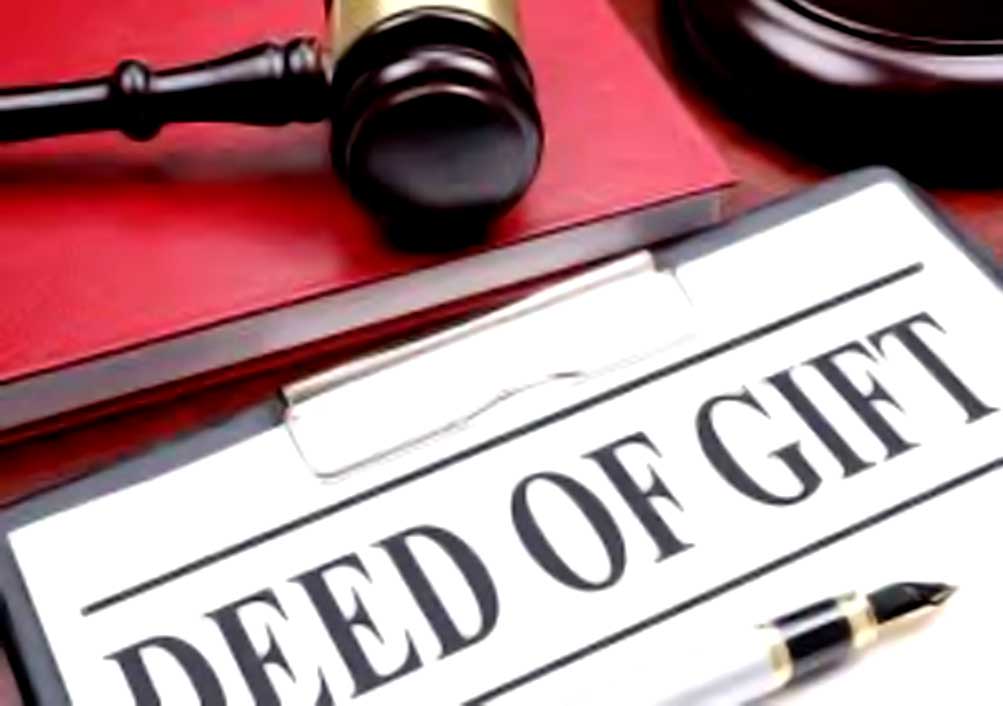Plea of invalidity of gift deed should be decided on holistic examination of entire evidence relating to execution & validity of gift deed: SC

Read Judgment: Keshav & Others V. Gian Chand & Another
Pankaj Bajpai
New Delhi, January 24, 2022: The Supreme Court has opined that findings of facts by the lower courts can be interfered in the second appeal only if they are perverse or some gross illegalities have been committed in arriving at such findings.
A Division Bench of Justice M.R. Shah and Justice Sanjiv Khanna observed that the plea as to invalidity of the gift deed is not to be decided on general presumption & assertion, and rather, should be based upon a holistic examination of the entire evidence relating to execution and validity of the gift deed.
Going by the background of the case, the dispute relates to land which was owned by Hardei, who died issueless in 1991. Gian Chand (Respondent) is the son of Hardei’s brother, whereas Keshav (Appellant) is her sister’s son. Gian Chand and Dhanbir, on Dec 04/06, 1991, instituted a Civil Suit for declarations that late Hardei had gifted the land to them during her lifetime vide gift deed, which was registered with the SubRegistrar, Salooni. Accordingly, Gian Chand and Dhanbir were put in possession of the land by Hardei. However, Keshav in connivance with others, had got mutation recorded in his favour. Hence, Gian Chand and Dhanbir prayed for a decree of permanent injunction restraining Keshav and others from interfering with their possession of the land.
This suit was challenged on grounds of validity of the gift deed. Keshav claimed that he was a tenant in occupancy of the land for over 15 years, a fact admitted by Hardei before the revenue authorities. Keshav had therefore acquired rights over the land. Hardei, during her lifetime, had denied execution of the gift deed and opposed the request of mutation of the land in favour of Gian Chand and Dhanbir, which request for mutation was rejected in 1989.
On the question of possession of the land, the trial court agreed with Keshav that he was in possession of the land as a tenant of Hardei for the last 15 years. The High Court however, reversed the concurrent findings on the ground that the trial court and the first appellate court had misread and misinterpreted the documentary and oral evidence. When the matter was remanded by this Court to the High Court for fresh hearing, the High Court ruled that in terms of execution, the gift deed satisfies the legal mandates of Sections 122 & 123 of the Transfer of Property Act, 1882 and being a registered document, it enjoys presumption of truth.
After considering the submissions, the Apex Court found that considering that the very origin of the gift deed was disputed by the executant during her lifetime, the lower courts were right in weighing the evidence of the gift deed on the touchstone of its validity first, rather than its form and content.
The fact in issue in the present case is the voluntariness and animus necessary for the execution of a valid gift deed, which is to be examined on the basis of evidence led by the parties who could depose for the truth of this fact in issue, added the Court.
Speaking for the Bench, Justice Khanna observed that the judgment in the second appeal by the High Court, unfortunately, chose to ignore and not deal with the fact in issue in the background of the case, but was completely influenced by the evidence led to support execution and registration of the document, and not whether execution was voluntary and in exercise of unfettered will to effect gratuitous transfer of land.
When a person obtains any benefit from another, the court would call upon the person who wishes to maintain the right to gift to discharge the burden of proving that he exerted no influence for the purpose of obtaining the document, added the Bench.
Hence, the Apex Court allowed the appeal, observing that views and findings recorded by the lower courts were well reasoned and had taken into account several factors that repelled and contradicted the claim of a valid execution of the gift deed by Hardei favouring the Respondents.
Sign up for our weekly newsletter to stay up to date on our product, events featured blog, special offer and all of the exciting things that take place here at Legitquest.




Add a Comment